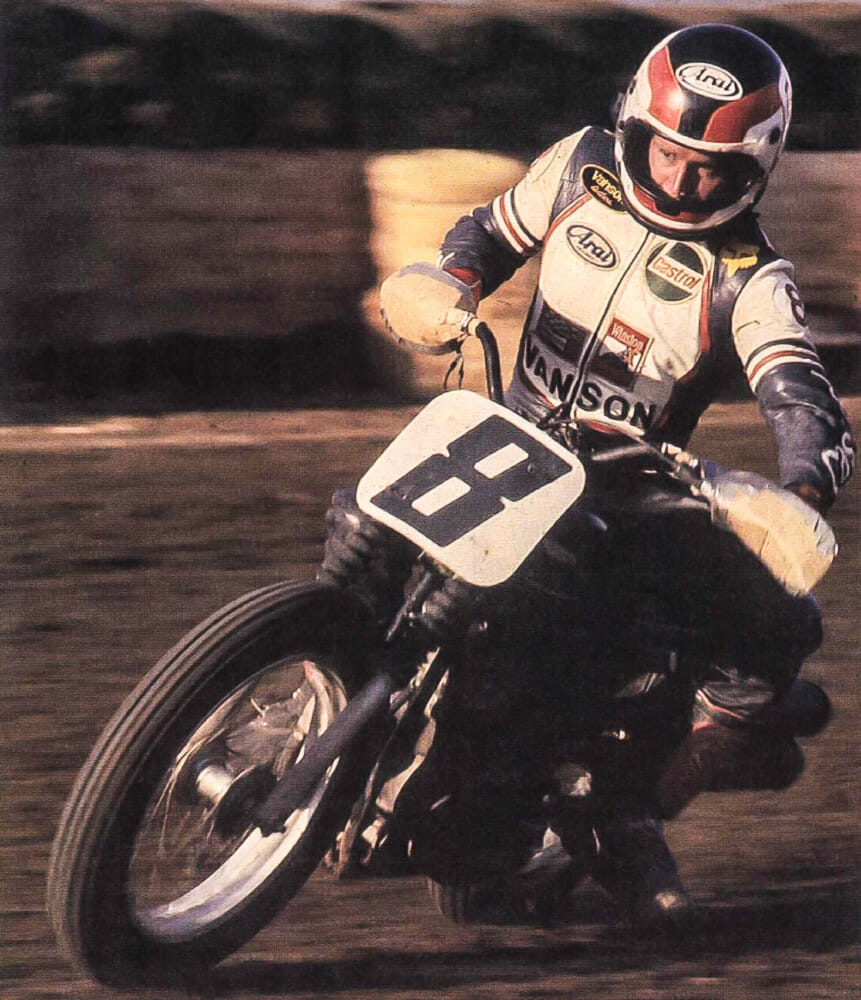Cycle News Archives
COLUMN
This Cycle News Archives Column is reprinted from issue issue #25, June 30, 2004. CN has hundreds of past Archives columns in our files, too many destined to be archives themselves. So, to prevent that from happening, in the future, we will be revisiting past Archives articles while still planning to keep fresh ones coming down the road -Editor.
Year of the Privateer
By Scott Rousseau
You could say that privateer Grand National flat-track racer Steve Eklund won the 1979 AMA Grand National Championship just in the nick of time.
It wasn’t as though non-factory-sponsored flat-trackers had gone completely unnoticed in the decade of the ’70s. Some of the sport’s most prominent names, such as former titleist Gary Scott, his brother Hank, and the man who would come to epitomize the term with a long and prosperous career, Steve Morehead, were all capable of stealing wins from the mighty Harley-Davidson factory effort. And they did so with regularity, but down the stretch of an invariably long Camel Pro or Winston Pro or whatever Pro season, a lack of funding was the primary cause in the odd mechanical breakdown and/or missed National that would often make up the difference between going home with the number-one plate and just going home.

Not since Dick Mann’s title during the 1963 season had the privateers been able to wrestle the title away from the factory teams, although they had been valiant in their attempts to do so. Consider that, following the ’70 and ’71 seasons, where the top three spots in the standings were swept by factory riders of dying British brands, privateers figured heavily into the championship chase. Privateer Gary Scott was second to Mark Brelsford in 1972, embarked on a brief stint with Triumph before winning his only title for Harley in 1975 and then returning to the privateer ranks to battle new Harley factory star Jay Springsteen to the wire in 1976.
Then along came Eklund of San Jose, California, in 1978. He had been hovering inside the top five since the 1976 season, which earned him Rookie of the Year honors. Proving himself as a capable short-tracker and TT racer, Eklund started 1978 with a bang, sweeping both rounds of the season opener in the Houston Astrodome and collecting three more victories in the middle of the season—two of them were half-miles, illustrating the progress his big-bike program was making—to finish second to Springsteen by just five points. The year 1979 was to be Eklund’s.
Springsteen started the ’79 season on the ropes, for that was the year that a mysterious stomach ailment, one that continues to haunt the legendary rider to this day, took root, causing him to miss four Nationals. With good finishes in the first half of the season and bolstered by a big mile win in front of his home crowd at San Jose, Eklund built a 40-point cushion that he merely needed to maintain to ensure the title. He would only land two more wins, the TTs at Santa Fe and Ascot, and he would score just one point in the final two races of the season, but the pressure was on Springsteen. Second in the standings after a miraculous comeback charge, he still needed to win the final two Nationals of the year. He won neither and thus Eklund became the first privateer rider to land the AMA Grand National title since Mann some 16 years earlier.
None too soon, either, because that was the final season of a decade otherwise owned by the factory teams. Thus, Eklund’s title is an unbreakable link in a chain, you see. He is the privateer champion of the ’70s, just as Ricky Graham would become the privateer champion of the ’80s (1982) and ’90s (1993), scoring important titles for the also-rans when such titles desperately needed to be scored. Thanks to privateers Joe Kopp and Chris Carr, the sole remaining Harley factory team has been shut out in its attempts to earn a title in the new millennium. Maybe that will change. Maybe not. [Kenny Coolbeth won the first of his three-consecutive Grand National Championships in 2006 on a factory H-D.~Editor.] The point is that for all the money that BSA and Triumph and Yamaha and then Honda, and yes, Harley-Davidson, have poured into the sport, the backbone of flat track has been and always will be the privateer.
Sadly, that backbone suffered a severe blow with the loss of Eklund after the Albuquerque, New Mexico, Half Mile on June 17, 1990. Leading factory Harley rider Chris Carr late in the National, Eklund appeared on his way to victory when he collided with a lapper and struck a guardrail post, suffering massive head injuries. After languishing in a coma for more than a year. Eklund passed away on September 26, 1991.CN
Eklund was inducted into the AMA Motorcycle Hall of Fame in 1998.
Click here to read the Archives Column in the Cycle News Digital Edition Magazine.
Subscribe to nearly 50 years of Cycle News Archive issues
Click here for all the latest Flat Track racing news.
